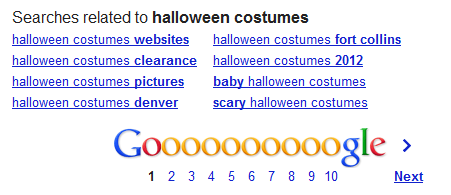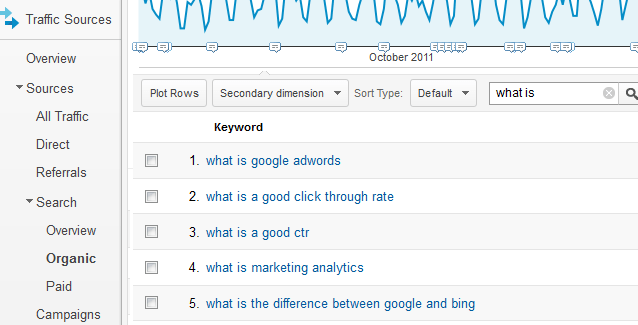
Let this long-tailed tit be your guide! (Via BinaryApe)
We’ve been banging the drum about long-tail keywords for a long (ahem) time. Recently, I explained why it’s so hard to rank for competitive keyword phrases with a new website. The answer? Keep trying, and target more specific, less competitive long-tail keywords in the meantime. We also talked about whether you should target head terms or long-tail keywords in my Content Marketing FAQ. The answer? BOTH! As you’re building out your site content, your keyword taxonomy should naturally include both broad and narrow terms.
Hopefully by now, whatever the size, type, or age of your business, you understand that long-tail keywords should be a part of your SEO content strategy. The long-tail keywords you find could be used as the title and main topic for a highly targeted blog post or article (or video, or infographic, or any other type of content), or you could use them as variations to better optimize a longer guide or article targeting one primary keyword – for example, by using the long-tail keywords in your subheads and image file names. And if you’re running niche marketing campaigns, super-specific long-tail keywords will be your best friend.
So where should you go to find those traffic- and lead-driving long-tail keywords? Here are nine tips to get you started.
1. Use Google Suggest
Google Suggestions are an awesome source of long-tail keyword variations. Just start typing your primary keyword into the Google search box and see what variations Google suggests:

If it turns up in a Google suggestion, you know that it’s a phrase people are searching for. These suggestions won’t necessarily inspire your faith in humanity (we all remember the “I am extremely terrified of Chinese people” debacle …), but they might inspire good content.
2. Use Google’s Related Searches
Same principle as the Google Suggestions that appear while you’re typing your query, but these suggested related searches appear at the bottom of the SERP, below the first page of organic results:

You may get slightly more suggestions here (in this case, eight keywords versus just four above), and they may also be slightly more personalized (Google knows I live in Colorado, hence the “Denver” and “Fort Collins” modifiers).
3. Use More and Different Keyword Research Tools
If you only use one keyword tool every time you do keyword research, you’re selling yourself short and probably missing out on tons of long-tail keyword variations. The Google Keyword Tool is a great basic tool and a good place to start, but if you’re looking for more long-tail keywords, try these other options too:
- WordStream’s Free Keyword Tool – Sorry to toot our own horn, but you really will get more long-tail suggestions and find more keyword niches with our keyword tool than most other tools out there.
- Google Trends – Find out what people are searching on right now (like “Who will win the 2012 election?”).
- Social Media Tools – For example YouTube’s keyword tool and Twitter Search.
The more keyword tools you consult, the more long-tail keyword variations you’re likely to find.
4. Mine Your Analytics
Your analytics will tell you many, if not all, of the keyword phrases that lead visitors to your website. By digging through these keyword referrers, you’ll be able to find a bunch of long-tail queries that are driving traffic for you. These keywords may be relevant to your business but not yet highly targeted by a single page on your site. For example, a few years ago we found that a lot of people were searching on the phrase “what’s a good click through rate” to wind up at our site, but we didn’t have a page with that title, so we wrote one, and now it drives tons of traffic.
To find your own private store of long-tail keywords, go into your analytics and locate your organic keyword referrals (in Google Analytics, the path is Traffic Sources -> Sources -> Search -> Organic). You can simply scan all the terms for good, relevant long-tail keywords you can turn into content, or you can set the time frame to something pretty large (depending on your traffic flow, try a 3-, 6-, or 12-month period) so you’ll have a lot of data to look at, then search for patterns. For example, you might search for question keywords (i.e. terms that begin with “what,” “why,” etc.).

5. Mine Your Search Query Reports
If you’re running a PPC campaign in AdWords, don’t forget to use your Search Query Report the same way you’d use your analytics, just one of many ways that PPC data can inform your SEO. Your Search Query Report shows you the search queries that drove people to click on your ads, rather than your organic search results. As an added bonus, you get fuller access to this data than you do your organic referrers in Google Analytics. It may also be easier to see which keywords are driving conversions, not just traffic. High-converting long-tail keywords are especially worth chasing.
6. Browse eHow
Sites like eHow are pretty much entirely fueled by keyword research, primarily long-tail keyword research. Demand Media, the company that owns eHow, Cracked.com and other sites, uses powerful algorithms to find long-tail keywords it can then rank for with hyper-targeted content.
You might not have Demand Media’s data sources or insanely profitable content algorithms on your side, but you can still learn from this methodology. Browse these sites for keyword ideas. If eHow is targeting a keyword phrase, you can bet it has search volume and that advertisers are interested in buying placement on those pages. Another good bet? Whatever they have produced to target those keywords is probably pretty lame. The content eHow churns out is produced on the cheap by freelancers and tends to be thin content, the kind of stuff that post-Panda Google no longer favors. If you can create strong content with real value that is also hyper-targeted, you have a good chance of outranking the content farms.

7. Browse Q&A Sites
Like Demand Media properties, Q&A sites can be a good source of long-tail keyword ideas. I’m talking about sites like:
- Quora (here are some tips for using Quora to find content ideas)
- Yahoo Answers
- Answers.com
- Askville by Amazon
- LinkedIn Answers
Questions make great long-tail keywords – it couldn’t be more obvious that these people are looking for answers and information.

Of course you’ll want to do a little keyword research to find the version of each question that has the right search volume and competition level. Not every question you find on a Q&A site is going to be a worthwhile keyword to attack.
8. Browse Wikipedia
Is Wikipedia the most optimized site on the Internet? It’s definitely up there. You can learn a lot by copying Wikipedia’s on-page optimization. When doing research around a base term, try checking the Wikipedia page. For example, look at the table of contents (this for the “Quantum Mechanics” page):

A lot of these headings translate into long-tail keywords (“history of quantum mechanics,” “mathematical formulations of quantum mechanics,” “applications of quantum mechanics,” etc.). You can also do a page search (Control-F) on the page for your primary keyword and see what other variations appear throughout the text. In addition, the “See Also” section at the bottom of many Wikipedia articles can be helpful for finding clusters of related terms.
9. Steal From Competitors
For informational queries, Wikipedia is often your competitor. But always check out the competition when you’re chasing a keyword term. Start with head and mid-tail terms that you’re trying to rank for, and see what types of keyword variations are used on the pages that are ranking in the top 5-10 spots. For example, let’s say you’re chasing the keyword “holiday crafts.” Scope the page that ranks #1 for that keyword on Google and see what keywords it’s using (keywords everywhere!):

Share Your Long-Tail Keyword Research Tips
Have you discovered other sneaky ways to find long-tail keyword terms? Let us know in the comments!







